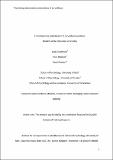Files in this item
From theorizing radicalization to surveillance practices : Muslims in the cross hairs of scrutiny
Item metadata
| dc.contributor.author | Blackwood, Leda | |
| dc.contributor.author | Hopkins, Nick | |
| dc.contributor.author | Reicher, Stephen | |
| dc.date.accessioned | 2017-07-30T23:33:06Z | |
| dc.date.available | 2017-07-30T23:33:06Z | |
| dc.date.issued | 2016-10 | |
| dc.identifier | 207756005 | |
| dc.identifier | 633be2eb-b3a4-4a54-a953-07c490c7cb15 | |
| dc.identifier | 84988037357 | |
| dc.identifier | 000384625100002 | |
| dc.identifier.citation | Blackwood , L , Hopkins , N & Reicher , S 2016 , ' From theorizing radicalization to surveillance practices : Muslims in the cross hairs of scrutiny ' , Political Psychology , vol. 37 , no. 5 , pp. 597-612 . https://doi.org/10.1111/pops.12284 | en |
| dc.identifier.issn | 0162-895X | |
| dc.identifier.uri | https://hdl.handle.net/10023/11326 | |
| dc.description | This research was funded by the Leverhulme Trust and the Scottish Institute of Policing Research. | en |
| dc.description.abstract | There are several psychological analyses of the processes of radicalisation resulting in terrorism. However, we know little about how those in authority (e.g., the police) conceptualise the psychological dynamics to radicalisation. Accordingly, we present a detailed account of an official UK counter-terrorism intervention, the Workshop to Raise Awareness of Prevent, designed to enlist front-line professionals in identifying and referring those at risk of radicalisation. Specifically, we report data gathered during an observation of this intervention delivered by the police in Scotland. This provides insight into the psychological model of radicalisation being disseminated in the UK and we evaluate the merits of this model in the light of current psychological theory. First, we consider how this model may overlook certain social dynamics relevant to understanding radicalisation. Second, we discuss how this neglect limits consideration of how the surveillance warranted by the official model may lead Muslims to disengage from majority group members. Our analysis points to how political psychology’s analysis of social identities and citizenship can inform public policy and practice. | |
| dc.format.extent | 16 | |
| dc.format.extent | 96436 | |
| dc.language.iso | eng | |
| dc.relation.ispartof | Political Psychology | en |
| dc.subject | Terrorism | en |
| dc.subject | Muslims | en |
| dc.subject | Surveillance | en |
| dc.subject | Radicalisation | en |
| dc.subject | Deradicalization | en |
| dc.subject | JZ International relations | en |
| dc.subject | NDAS | en |
| dc.subject | SDG 16 - Peace, Justice and Strong Institutions | en |
| dc.subject.lcc | JZ | en |
| dc.title | From theorizing radicalization to surveillance practices : Muslims in the cross hairs of scrutiny | en |
| dc.type | Journal article | en |
| dc.contributor.institution | University of St Andrews. School of Psychology and Neuroscience | en |
| dc.contributor.institution | University of St Andrews. St Andrews Sustainability Institute | en |
| dc.identifier.doi | 10.1111/pops.12284 | |
| dc.description.status | Peer reviewed | en |
| dc.date.embargoedUntil | 2017-07-30 |
This item appears in the following Collection(s)
Items in the St Andrews Research Repository are protected by copyright, with all rights reserved, unless otherwise indicated.

